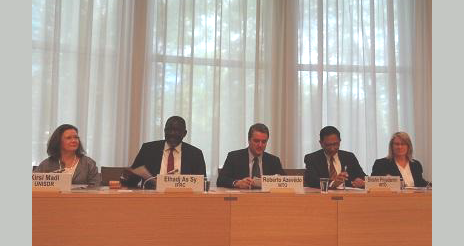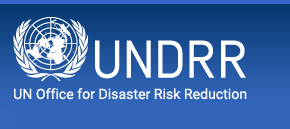- Our Mandate
- Mission and Objectives
- UNDRR in the UN
- Work Programme & Annual Reports
- Results Based System
- Work Partnerships
- Headquarters - Geneva
- SG-UN representatives for DRR
- Regional Office – The Americas and the Caribbean
- Head of the Regional Office – The Americas and the Caribbean
- What is Disaster Risk Reduction?
- What is the International Strategy?
- History of UNDRR
WTO opens dialogue on trade and disasters
 (From left) Trade and Disasters Symposium panel: UNDRR Director, Kirsi Madi, IFRC Secretary-General, Elhadj As Sy, WTO Director-General, Roberto Azevêdo, WTO Panel Moderator, Shishir Priyadarshi, and Ambassador Frances Lisson, Australia.
(From left) Trade and Disasters Symposium panel: UNDRR Director, Kirsi Madi, IFRC Secretary-General, Elhadj As Sy, WTO Director-General, Roberto Azevêdo, WTO Panel Moderator, Shishir Priyadarshi, and Ambassador Frances Lisson, Australia.
GENEVA, 26 April, 2018 - The World Trade Organization today called for greater dialogue on the impacts of the growing number of disasters on world trade and the role trade can play in building resilience to disasters.
It also announced that its Aid For Trade section will undertake a mapping exercise to capture the experience of disaster-affected members and release a report early next year.
Mr. Roberto Azevêdo, WTO Director-General, opening the "Natural Disasters and Trade Symposium", said that the immediate catalyst for deciding to look at the issue was the Declaration made at the WTO's 11thMinisterial Conference in December by Dominica and other Eastern Caribbean states on the catastrophic damage caused by last year's Atlantic Hurricane Season.
The Symposium heard that Dominica lost over $1 billion as a result of category 5 Hurricane Maria, equivalent to over 242% of the small island developing State's GDP and the overall poverty rate on the island has risen from 28.8% to 42.8%, according to Mr. Ricardo James, representative of the Organisation of Eastern Caribbean States (OECS).
Mr. Azevêdo also cited the example of Vanuatu whose graduation from least-developed country status had to be pushed back until 2020 because of Cyclone Pam.
WTO has acted in response to a number of disasters including trade preferences granted to Nepal in the wake of the 2015 earthquake and Pakistan following the 2010 floods.
Mr. Azevêdo said: "UNDRR says disaster risk reduction is everyone's business and I absolutely agree with this sentiment and my hope is that this symposium will stimulate dialogue on these issues."
He called for examination of disaster impacts through Trade Policy Reviews and other interactions. "Let's look for ways that the trade community can respond to disasters, support recovery and promote resilience."
Mr. Elhadj As Sy, Secretary-General, International Federation of Red Cross and Red Crescent Societies, recalled the devastating impact of the ebola pandemic in terms of both loss of life and the economic impact on the affected countries, Guinea, Liberia and Sierra Leone.
He said borders were closed, flights cancelled, markets shut. "People were not allowed to gather or even to trade. It had an impact on people's nutritional status, particularly of pregnant women and babies. The underlying problems were exacerbated and it increased mortality and morbidity."
Mr. As Sy said the lack of trading and banking facilities was a major factor in so few people deciding to return to the small island of Barbuda in the Caribbean after it was devastated in last year's hurricanes.
Natural hazards and disasters provide opportunities for trade in the effort to build back better so people are not left in the same condition of vulnerability as they were before.
Ambassador Frances Lisson of Australia said the country's economic losses from disasters were predicted to double by 2050 and there was great concern about the impacts of disasters on its neighbours in the Pacific.
Ambassador Lisson observed that improved customs procedures can quicken the delivery of goods. She stated that Australia was giving a grant to WTO to look at the role that trade can play in building resilience to disasters and pointed to the importance given to these issues under the Sendai Framework for Disaster Risk Reduction.
Ms. Kirsi Madi, UNDRR Director, said: "Trade has the potential to be one of the great drivers of the 2030 Agenda for Sustainable Development and achieving the eradication of poverty. In order to do that, it has to be inclusive and address inequality by taking affirmative action to support those countries which are on the front line of climate change, extreme weather events and at the mercy of seismic risk."
She said it was encouraging to hear that WTO "is embarking on a mapping exercise to gain an improved understanding of the issues that your Members face as a result of the increasing impact of disasters."
Ms. Madi said: "This work is important when you consider how much damage earthquakes and extreme weather events have inflicted on low and middle income countries in recent times.
"Disruption to manufacturing, tourism and trade play a significant role in the GDP losses sustained in these events particularly in small island developing states."
Related links
Sendai Framework for Disaster Risk Reduction
Follow the UNDRR news online :
 Now we have twitter account @UNDRR Américas y el Caribe
Now we have twitter account @UNDRR Américas y el Caribe
JOIN US!
Tweets por el @UNDRR Américas y el Caribe
